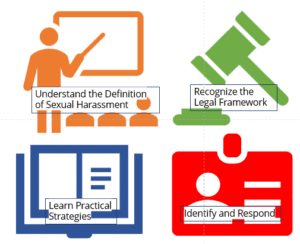What is Sexual Harassment?
Sexual harassment in the workplace involves unwelcome behavior of a sexual nature that creates an intimidating, hostile, or offensive work environment. This can include verbal comments, such as inappropriate jokes or remarks about someone’s appearance; physical actions, like unwanted touching or assault; and visual displays, such as sexually explicit images or gestures. It also covers quid pro quo harassment, where job benefits are contingent on sexual favors. Such behavior affects the well-being and productivity of employees and can lead to legal consequences for employers if not properly addressed and prevented.
What is Sexual Harassment Prevention Training of Employees for WorkPlace?
A sexual harassment Prevention course for employees is a training program designed to educate workers on recognizing, preventing, and responding to sexual harassment in the workplace. It covers definitions, legal frameworks, reporting procedures, and practical strategies for intervention and prevention. The course aims to create a safe, respectful, and inclusive work environment by raising awareness about inappropriate behaviors and providing tools to address and report harassment. Additionally, it ensures compliance with federal and state laws, reducing the risk of legal issues and fostering a culture of respect and accountability within the organization.
Learning Objectives For Sexual Harassment Prevention Training:
 Understand the definition of sexual harassment and identify different forms, including verbal, physical, visual, and third-party harassment.
Understand the definition of sexual harassment and identify different forms, including verbal, physical, visual, and third-party harassment.- Recognize the legal framework surrounding harassment, including relevant laws such as Title VII of the Civil Rights Act and EEOC guidelines.
- Learn practical strategies for preventing and addressing harassment in the workplace, including bystander intervention techniques.
- Identify and respond to quid pro quo harassment, where job benefits are traded for sexual favors.
- Understand the role of bystanders in preventing and addressing harassment and empowering employees to intervene effectively.
- Learn about retaliation and understand employees’ rights and responsibilities when facing retaliatory actions.
- Gain knowledge on how to report incidents of harassment and the procedures to follow within the organization.
- Recognize the impact of harassment on individuals and organizational culture and the importance of fostering a respectful work environment.
- Understand the importance of protecting oneself from harassment and the steps to take if subjected to inappropriate behavior.
- Gain awareness of sex stereotyping and its impact on workplace equality and diversity.
Sexual Harassment Course Outline:
1. Introduction
- Importance of Understanding Sexual Harassment
- Objectives of the Training
2. Defining Sexual Harassment
- What is Sexual Harassment?
- Legal Definitions and Frameworks
- Differentiating Lawful and Unlawful Behavior
3. Types of Harassment
- Sexual Harassment
- Bullying
- Third-Party Harassment
- Verbal, Non-Verbal, and Physical Harassment
4. Protecting Yourself
- Strategies to Safeguard Yourself from Harassment
- Recognizing Warning Signs
- Importance of Documentation and Reporting
5. Role of Bystanders
- Understanding Bystander Intervention
- The 5 D’s: Direct, Delegate, Distract, Document, Delay
- Encouraging Active Bystandership
6. Retaliation
- Understanding Retaliation
- Legal Protections Against Retaliation
- Steps to Take if Retaliation Occurs
7. Dealing with Harassment
- Reporting Procedures
- Internal and External Resources
- Support Systems and Counseling
8. Case Studies and Scenarios
- Real-Life Examples
- Interactive Discussions
- Analyzing Outcomes and Best Practices
9. Summary and Q&A
- Recap of Key Points
- Open Floor for Questions and Clarifications
- Additional Resources and Further Reading
10. Conclusion
- Reflecting on Implementation in Daily Interactions
- Commitment to Creating a Respectful Workplace
- Contact Information for Further Support
This course structure ensures a comprehensive understanding of sexual harassment, legal aspects, preventive measures, and practical steps to address and report harassment. It empowers employees to contribute to a respectful and safe workplace environment.
Which laws require Employees to take Sexual Harassment Prevention Training
Taking a sexual harassment prevention course helps organizations comply with several federal and state laws designed to protect employees from harassment and ensure a safe work environment. Here are the key laws met by such training:
Federal Laws
1. Title VII of the Civil Rights Act of 1964
- Prohibits employment discrimination based on race, color, religion, sex, or national origin.
- Enforced by the Equal Employment Opportunity Commission (EEOC), this law includes protections against sexual harassment.
2. The Equal Employment Opportunity Commission (EEOC) Guidelines
- Provides detailed guidelines for employers on preventing and addressing workplace harassment.
- Requires employers to take reasonable steps to prevent and correct harassment.
State Laws
Many states have their own specific requirements for sexual harassment training. Here are some examples of state laws that mandate sexual harassment prevention training:
1. California
- California Fair Employment and Housing Act (FEHA)
- Requires employers with five or more employees to provide sexual harassment prevention training.
- Supervisors must receive at least two hours of training, while non-supervisory employees must receive one hour of training every two years.
2. New York
- New York State Human Rights Law
- Mandates that all employers provide annual sexual harassment prevention training to all employees.
- Training must be interactive and include information on state and federal laws, reporting procedures, and bystander intervention.
3. Illinois
- Illinois Human Rights Act
- Requires all employers to provide annual sexual harassment prevention training.
- Training must cover federal and state laws, reporting mechanisms, and employer responsibilities.
4. Connecticut
- Connecticut General Statutes
- Requires employers with three or more employees to provide two hours of training to all employees.
- Supervisors must receive training within six months of taking on a supervisory role and every ten years after that.
5. Delaware
- Delaware Discrimination in Employment Act
- Requires employers with 50 or more employees to provide interactive training to employees and supervisors.
- Supervisors must receive training within one year of taking on a supervisory role and every two years thereafter.
6. Maine
- Maine Human Rights Act
- Requires employers with 15 or more employees to provide training on sexual harassment prevention.
7. Washington
- Washington Law Against Discrimination (WLAD)
- Requires agricultural employers to provide annual training to employees on sexual harassment prevention.
- Most USA States require this training.
Benefits of Compliance
By complying with these laws through comprehensive sexual harassment prevention training, employers can:
- Protect employees from harassment and create a safe work environment.
- Reduce the risk of legal penalties, lawsuits, and financial liabilities.
- Promote a culture of respect and inclusivity in the workplace.
- Enhance employee morale, productivity, and retention.
Overall, sexual harassment prevention training is a critical component of an organization’s commitment to legal compliance and employee well-being.
Why This Sexual Harassment Prevention Training is Essential
Sexual harassment prevention training is required to ensure a safe, respectful, and productive work environment. Here are key reasons why this training is essential:
- Legal Compliance: Many laws and regulations mandate sexual harassment training to protect employees and reduce employer liability. Compliance helps avoid legal penalties and lawsuits.
- Awareness and Prevention: Training educates employees about what constitutes sexual harassment, enabling them to recognize and prevent inappropriate behavior.
- Empowerment and Reporting: It provides employees with the knowledge and tools to report harassment confidently, ensuring that incidents are addressed promptly and effectively.
- Fostering Respect: Promoting a culture of respect and inclusion reduces instances of harassment, enhancing overall workplace morale and productivity.
- Risk Mitigation: Proactive training minimizes the risk of costly litigation and damage to the organization’s reputation.
- Support for Victims: Training ensures that victims know their rights and the support available to them, fostering a safer and more supportive workplace.
By implementing comprehensive sexual harassment prevention training, organizations can create a positive work environment where all employees feel valued and safe.
Which Insurance Policy should be taken by the Company to cover the Claims
Employment Practices Liability Insurance (EPLI) protects companies from financial risks associated with employment-related claims such as wrongful termination, discrimination, and harassment. It covers legal costs, including attorney fees and settlements, and encourages best practices through risk management resources. EPLI provides financial security against substantial losses, aids in reputation management, ensures compliance with legal standards, and offers management peace of mind. Additionally, it boosts employee confidence by demonstrating the company’s commitment to a fair and safe work environment. Overall, EPLI is essential for mitigating employment risks and maintaining organizational stability.
Employment Practices Liability Insurance is a vital tool for companies to mitigate the risks associated with employment practices, protect their financial interests, and ensure compliance with legal standards. It provides a safety net that supports the company’s stability and commitment to a respectful and lawful workplace.
Who Should Take the Sexual Harassment Prevention Course for Employees?
The target audience for a sexual harassment prevention course includes:
- All Employees:
- To ensure everyone understands what constitutes sexual harassment and the importance of a respectful workplace.
- Human Resources Personnel:
- To provide them with the tools and knowledge needed to manage and investigate harassment claims effectively.
- Executives and Senior Leadership:
- To ensure they lead by example and support a culture of zero tolerance towards harassment.
- New Hires:
- To integrate them into the company’s policies and culture regarding harassment from the beginning.
- Contractors and Temporary Workers:
- To ensure they are aware of and comply with the organization’s harassment policies.
- Volunteers and Interns:
- To educate them on their rights and responsibilities regarding harassment in the workplace.
- Students taking Summer Job or Part Time Jobs:
- To ensure their safety, rights, and understanding of workplace harassment.
Some of the job role that need this training but not limited to it. It is better for all businesses to trainin their employees:
-
Physical therapist (PT)
-
Occupational therapist (OT)
-
Speech-language pathologist (speech therapist)
-
Respiratory therapist
-
Massage therapist
-
Mental health therapist / counselor
-
Clinical social worker / therapist
-
Psychologist
-
Registered nurse (RN)
-
Certified nursing assistant (CNA)
-
Home health aide (HHA)
-
Personal care aide / caregiver
-
Medical assistant
-
Dental hygienist
-
Pharmacist
-
EMT / paramedic
-
Tattoo artist
-
Body piercer
-
Cosmetologist / hair stylist
-
Barber
-
Nail technician
-
Hotel housekeeper / room attendant
-
Janitor / commercial cleaner
-
Security guard
-
Restaurant server / bartender
Please note that Supervisors and Managers should NOT take this course. Our two-hour course educates them on their responsibilities in preventing and addressing harassment, handling complaints, and fostering a safe work environment.
Sexual Harassment Prevention Course Details:
- Avg Training Completion Time: 1 Hour
- Format: Online Self-Paced Training
- Access: Online Access for 60 Days
- Certificate of Completion: Yes
- Training Certificate Expiry: 2 Years
- Audio: Yes
- License: Single User
Why Choose Our Sexual Harassment Prevention Course for Employees?
Course Features
- 24 x 7 access from anywhere for self-paced online courses
- Course meets state and federal requirements
- Courses created by Experts in the industry
- Instantly print or download Nationally Recognized Certificates
- Complete your course in one hour and get a certification
- Online course with audio and PowerPoint slides for easy understanding of training
- American Disability Act (ADA) compliant course format and delivery
- Online courses compatible with Windows, Apple, iPad, and other tablets
- Spanish Version is available
- Group Discount available.
- Unlimited Phone and Email Support
Free Sexual Harassment Prevention Course for Students
We will offer this course free of cost to students in USA schools, Colleges, or Universities. Please contact us for instructions on how to access the course.
Enroll Today
Take the proactive step towards a safer, more respectful workplace. Enroll in our Sexual Harassment Course today and empower your team with the knowledge and tools they need to maintain a harassment-free environment.
Testimonials
- The course was designed to provide an information to prevent harassment at work.It was very informative.
TAMAR KHZAALI - This was a great learning tool(training) and very informative and will be useful to anyone and everyone.
Kimberly (Kay) Kegley - This training was direct and informative. Clearly explained and easily understood. Thank you!!
Tineja Danielle Leslie - The course was very informative, it allowed me to get a clear understanding of the topic being discussed.
Celeste Moore - It was good. training video was easy to follow. questions came directly from the video.
Cordaryl Meaders - Very resourceful and detailed training for everyday decency.
KAYODE POPOOLA JOHNSON - Excellent training, learned new things.
Oscar Laureano - Great and simple to follow and understand.
Brandun Sical - Very Informative and Educational.
Patroy Quarry
Please contact us for more information at Bob@hipaatraining.net or call (515) 865-4591.
USER RATING:
Sexual Harassment Prevention Training for Employees is rated 4.9 out of 5 by 65 users.
